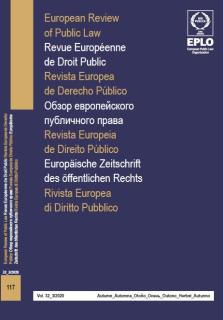
Constitutional Law / Droit constitutionnel
Austria / Autriche
Univ.-Prof. Dr., Institut für Österreichisches und Europäisches Öffentliches Recht,
Wirtschaftsuniversität Wien, email: harald.eberhard@wu.ac.at
Universitätsassistent prae doc, Institut für Österreichisches und Europäisches Öffentliches Recht,
Wirtschaftsuniversität Wien, email: jakob.fux@wu.ac.at
In 2019 and 2020, Austrian constitutional law was discussed intensively in connection with different legislative amendments in the light of their constitutionality, on the other hand itself was amended as well. In particular, the reorganization of the social security agencies raised various constitutional questions. The Federal Constitutional Law itself was also amended with regard to the introduction of a new, optional jurisdiction of the administrative courts for complaints, disputes or applications in other matters. In the case law of the Austrian Constitutional Court, the constitutional coping with the social security reorganization was, inter alia, on the agenda in the reporting period. In addition, in the same period three judgments on the prohibition of Islamic veiling in elementary schools, on killing on request and on inducement to or participation in suicide as well as on parliamentary committees of inquiry caused vivid discussions. The court repealed the prohibition of veiling in elementary schools and the prohibition of participation in suicide in Austrian criminal law as unconstitutional. Furthermore, with regard to the “Ibiza-Untersuchungsausschuss”, it found that the decision of the National Council’s committee of rules of procedure on the partial declaration of inadmissibility was illegal.
En 2019 et 2020, le droit constitutionnel autrichien a été discuté de manière intense en relation avec différentes modifications législatives à la lumière de leur constitutionnalité, d’autre part lui-même a été également modifié. Notamment, la réorganisation des organismes de sécurité sociale a soulevé diverses questions constitutionnelles. La Loi constitutionnelle fédérale elle-même a été aussi modifiée en ce qui concerne l’introduction d’une nouvelle juridiction facultative des tribunaux administratifs pour des plaintes, litiges et demandes dans d’autres domaines. Dans la jurisprudence de la Cour constitutionnelle autrichienne, traiter constitutionnellement la réorganisation de la sécurité sociale était, inter alia, à l’ordre du jour de la période de référence. En outre, pendant la même période trois décisions sur l’interdiction du port du voile islamique dans les écoles élémentaires, sur l’homicide sur demande et sur l’incitation ou la participation au suicide ainsi que sur les commissions d’enquête parlementaires ont provoqué des discussions animées. La Cour a abrogé l’interdiction du port du voile dans les écoles élémentaires et l’interdiction de la participation au suicide dans le droit pénal autrichien comme étant inconstitutionnelles. De plus, en ce qui concerne le “Ibiza-Untersuchungsausschuss”, la Cour a jugé que la décision de la commission du règlement du Conseil national sur la déclaration partielle d’irrecevabilité étail illégale.
In den Jahren 2019 und 2020 wurde das österreichische Verfassungsrecht einerseits durch eine Vielzahl einfachgesetzlicher Neuerungen und der Frage von deren Verfassungskonformität intensiv diskutiert, andererseits war es selbst von Neuerungen betroffen. Insbesondere die Neuorganisation der Sozialversicherungsträger warf vielfältige verfassungsrechtliche Fragen auf. Eine unmittelbare Änderung erfuhr die Kernurkunde des Verfassungsrechts, das Bundes-Verfassungsgesetz (B-VG), hinsichtlich der Einführung einer neuen fakultativen Zuständigkeit der Verwaltungsgerichte für Beschwerden, Streitigkeiten oder Anträge in sonstigen Angelegenheiten. Im Bereich der Rechtsprechung des Verfassungsgerichtshofes (VfGH) stand im Berichtszeitraum die verfassungsrechtliche Bewältigung der Sozialversicherungs-Neuorganisation auf der Tagesordnung. Für lebendige Diskussionen im Berichtszeitraum sorgten darüber hinaus drei Entscheidungen des Verfassungsgerichtshofs zum Verhüllungsverbot in Volksschulen, zur Tötung auf Verlangen und Verleiten zum beziehungsweise Mitwirkung am Suizid sowie zu parlamentarischen Untersuchungsausschüssen. Das Verhüllungsverbot in Volksschulen sowie das strafrechtliche Verbot der Mitwirkung am Suizid hob der Gerichtshof dabei als verfassungswidrig auf. Darüber hinaus stellte er betreffend den “Ibiza-Untersuchungsausschuss” fest, dass der Beschluss des Geschäftsordnungsausschusses des Nationalrates über die teilweise Erklärung der Unzulässigkeit rechtswidrig war.





















